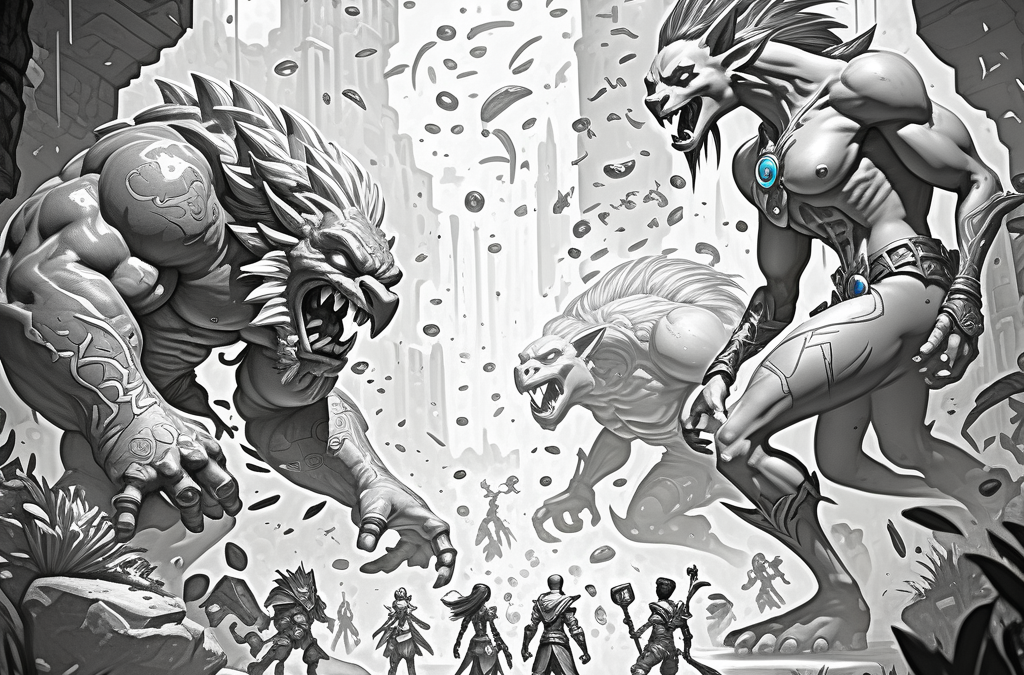In the thrilling world of video game design, characters have transformed from mere pixels on a screen into dynamic, intelligent beings ready to engage players like never before. Gone are the days of predictable characters that follow the same boring scripts. Thanks to the wonders of Artificial Intelligence (AI), we can now create game characters that learn, adapt, and surprise us in every playthrough. Imagine diving into an adventure where your allies evolve alongside you, and enemies devise strategies tailored to your choices. This article explores how AI is revolutionizing character development, making gaming experiences more immersive and enjoyable than ever. Whether you’re a budding developer or a curious gamer, let’s uncover the magic of making characters that truly think for themselves!
Understanding AI in Gaming: The Heart of Smart Characters
At its core, AI refers to computer systems designed to perform tasks that typically require human intelligence, such as recognizing speech or making decisions. In gaming, AI breathes life into characters, allowing them to interact with players in engaging ways.
What Makes Smart Characters “Smart”?
- Adaptability: Unlike traditional non-playable characters (NPCs), smart characters learn from their environments and your gameplay style. If you frequently take a stealthy approach, a character might set traps to challenge you.
- Dynamic Interactions: Smart NPCs can hold real conversations and respond to your emotions. They can evolve based on your choices, creating emotional stakes in the story.
Key Techniques in AI Development
- Decision Trees: These help NPCs make choices influenced by various factors, such as player actions and game environment.
- State Machines: Allow characters to switch between different moods, such as friendly or hostile, depending on the situation.
- Machine Learning: Enables characters to learn and adapt to player behavior over time, offering a unique gaming experience.
Building the Brains: Developing Intelligent NPCs
Creating intelligent game characters is an exciting journey that merges creativity and technology. Here’s how to get started:
- Brainstorming: Define who your characters are. Are they heroic figures, sly villains, or quirky sidekicks? This foundation is essential for character interaction.
- Programming AI Behaviors: This is where you give your characters a “brain.” Use techniques like behavior trees and state machines to program how they respond to player actions.
- Utilizing Game Engines: Leverage powerful tools like Unity and Unreal Engine, which have built-in resources for AI development. For example, Unity’s NavMesh helps characters navigate complex environments.
Crafting Unique Experiences: The Role of AI in Gameplay Dynamics
AI enhances the gaming experience by creating responsive environments and dynamic gameplay:
- Immersive Worlds: Intelligent NPCs make the game world feel alive, interacting with you based on your previous actions.
- Personalized Gameplay: AI adapts the game experience to fit player styles, making each playthrough unique.
Real-World Innovations: AI Examples Revolutionizing Gaming
Several games exemplify the power of AI in creating engaging experiences:
- “The Last of Us Part II”: NPCs communicate and strategize based on your actions, ensuring each encounter feels fresh.
- “Middle-earth: Shadow of Mordor”: The Nemesis System allows players to form personal rivalries with enemies, enhancing the sense of challenge and engagement.
The Future: AI in Game Development
As technology advances, the potential for AI in gaming continues to grow:
- Natural Language Processing: Expect NPCs to engage players in meaningful dialogue, fostering deeper connections.
- Anticipatory Gameplay: Characters could anticipate player moves, making for a more immersive experience.
Overcoming Challenges: Navigating the AI Development Landscape
While creating intelligent characters is exciting, it comes with challenges:
- Complexity: Developing AI requires a solid grasp of algorithms and coding languages. Embrace this learning opportunity to enhance your skill set.
- Balancing Difficulty: Striking the right balance in AI difficulty is crucial. Extensive playtesting helps fine-tune AI behavior to keep players engaged without overwhelming frustration.
Ethical Considerations: Balancing AI Innovation and Player Privacy
As AI technology evolves, developers must consider ethical implications:
- Data Privacy: Be transparent about how player data is collected and used, ensuring a safe gaming environment.
- Content Oversight: Monitor AI-generated content to prevent harmful or unwanted outcomes.
Conclusion
The role of AI in creating intelligent characters is undeniably transformative. The potential for characters that not only respond to our actions but also grow with us opens up a world of possibilities for developers and players alike. From engaging storytelling to dynamic gameplay, AI is set to redefine our interactions with beloved characters. For aspiring game creators, mastering AI technology is your ticket to crafting unforgettable gaming experiences. As you dive into this vibrant landscape, remember that balancing innovation and ethical responsibility will shape the future of smart characters. Gear up, unleash your creativity, and get ready to create the next generation of gaming magic!


